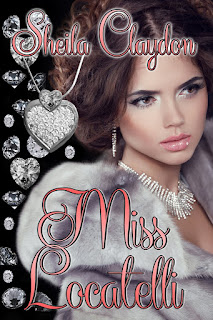I was 7 years old when I cleared out
the bottom half of my toy closet and, using the shelf as a desk, set myself up
as a writer. I’ve been writing ever since: poetry, non-fiction, stories for
children, but my absolute favourite is contemporary romantic fiction.
I truly believe that ‘love makes the world go round,’
so weaving stories around characters who are falling in love is what keeps me
writing. Sometimes I become so engrossed in what is happening in their lives,
that what was intended to be one book becomes a series. My When Paths Meet trilogy is an example of this. When I finished writing
Mending Jodie’s Heart, I wanted to
know what happened to her younger sisters. Finding
Bella Blue (Book 2) and Saving Katy
Gray (Book 3) were the result.
Falling in love should be about far more than the
romance and my stories always are. Far from being perfect, my characters
frequently have to face up to some uncomfortable truths before they can learn
to truly love. I hope you will check them out, and enjoy them.
I write contemporary fiction. My books are listed below:
When Paths Meet Trilogy:
Mending Jodie’s Heart (Book
1)
Finding Bella Blue (Book
2)
Saving Katy Gray (Book
3)
Miss Locatelli
Kissing Maggie Silver
Double Fault
Reluctant Date
Cabin Fever
The Books We Love Special Edition
Miss Locatelli
 |
| Amazon |
Arabella
knows her audacious plan to save her family’s century old jewelry business
doesn’t stand a chance without Luca Ezio. She just wishes he wasn’t helping her
because her grandfather asked him to, but because he wants to.
For his part, Luca can’t remember when he was last so turned on by a woman and he doesn’t like it one little bit. Apart from being way too young, Arabella is the granddaughter of a client whose relationship with his family is complicated. The right thing to do would be to walk away but his heart has other ideas. Then Arabella’s life begins to unravel in a way that affects both of them and suddenly Luca finds himself fighting for his future as well as for her heart.
For his part, Luca can’t remember when he was last so turned on by a woman and he doesn’t like it one little bit. Apart from being way too young, Arabella is the granddaughter of a client whose relationship with his family is complicated. The right thing to do would be to walk away but his heart has other ideas. Then Arabella’s life begins to unravel in a way that affects both of them and suddenly Luca finds himself fighting for his future as well as for her heart.
 |
| Amazon |
Mending
Jodie’s Heart
When
musician Marcus Lewis buys the derelict farmhouse next to Jodie’ Eriksson's
riding school he doesn’t know whether to be amused or irritated by her angry
reaction to his plans. Then her sister Izzie visits him and makes things a
whole lot worse…or is it better…because now he has an excuse to see Jodie
again. Although, when he sees her, it’s not exactly a meeting of minds, they do
discover they have one thing in common; they both believe they know what’s best
for Izzie, and for Marcus' son Luke.
It turns out they’re wrong. The children they thought they were protecting need to be set free. It’s Jodie and Marcus who have the problem; but can two broken hearts make one whole one? The battle lines that were set when they first met have long since been breached but the war won’t be over until Jodie learns how to trust again, and until Marcus allows himself to believe in his son.
It turns out they’re wrong. The children they thought they were protecting need to be set free. It’s Jodie and Marcus who have the problem; but can two broken hearts make one whole one? The battle lines that were set when they first met have long since been breached but the war won’t be over until Jodie learns how to trust again, and until Marcus allows himself to believe in his son.
Kissing Maggie Silver
 |
| Amazon |
Maggie
Silver intends to put as much space as possible between herself and her family
just as soon as her parent’s ruby wedding celebrations are over. She is fed up
with their constant advice and her never-ending babysitting duties. There’s a
great big world out there and she wants to see it before she settles for
suburbia. Then Ruairi O’Connor turns up at the same time her sister-in-law goes
into labor, and suddenly everything becomes a lot more complicated.
As for Ruairi, in a few weeks time he will be on the other side of the world, so now is not the time to fall in love, especially with Maggie. Until now he’s thought of her as little more than a child so why has he suddenly discovered she is very grown up indeed and the only thing he wants to do is kiss her.
As for Ruairi, in a few weeks time he will be on the other side of the world, so now is not the time to fall in love, especially with Maggie. Until now he’s thought of her as little more than a child so why has he suddenly discovered she is very grown up indeed and the only thing he wants to do is kiss her.
Find Sheila's books at http://bookswelove.net/authors/claydon-sheila/





















.png)
.jpg)


